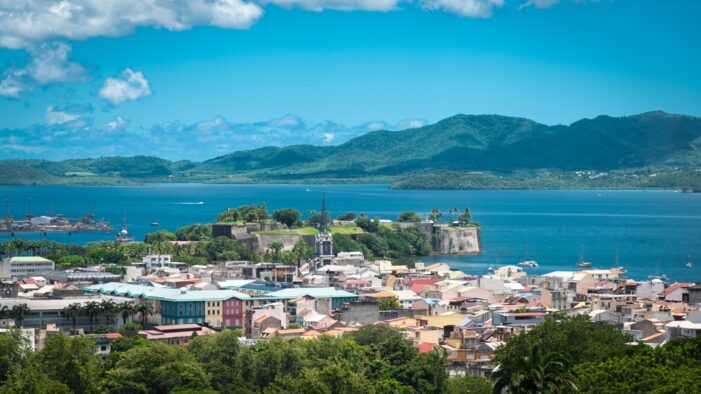Martinique, an overseas French department and EU territory, blends vibrant Afro‑Creole heritage, French legal stability, and access to European markets—creating a unique investment environment. For African American investors seeking cultural alignment and reliable returns, Martinique offers creative tourism, sustainable agriculture, real estate, and innovation opportunities supported by French incentives.
- Cultural Heritage & Identity
Martinique’s identity draws from African, French, Indigenous Kalinago, Indian, Caribbean and Lebanese influences—forming a rich Afro‑Creole cultural fabric. Music genres like bèlè, biguine, kadans, and globally popular zouk evolved here and Guadeloupe. Carnival is a major event, featuring costumed parades, drumming, and striking traditions such as drag and symbolic effigies like Vaval being burned.
French and African culinary traditions merge in dishes like Colombo curry, boudin, and seafood-based meals, while storytelling and film reflect Afro-Caribbean narratives—from Martinican poets to filmmakers like Euzhan Palcy and music icons like Jocelyne Béroard.
For African American investors, the cultural resonance lies in collaboration with local musicians, culinary experiences, arts residencies, or heritage lodgings grounded in Creole identity.
- Languages & Social Cohesion
French is the official language, spoken across government, business, and education. Simultaneously, Martinican Creole—a French-based creole with African, English, Spanish, and Indigenous linguistic elements—is widely used by over 70% of residents in everyday life. In May 2023, the regional assembly officially recognized Creole as an official language alongside French.
This bilingual setting supports both formal engagement (in French) and culturally authentic efforts (in Creole)—offering opportunities for brand storytelling that resonates with diaspora identity.
- Economic Resources & Key Sectors
Services & Tourism
The economy is dominated by the service sector (~83% of GDP)—primarily tourism, public services, and administration. Tourism is vital, bringing in roughly $400 million USD annually, with arrivals from mainland France, Europe, and North America. Attractions include beaches, UNESCO-designated sites like Mont Pelée, and growing eco-tourism offerings.
Agriculture & Rum
Agriculture contributes about 6% of GDP, featuring bananas, sugarcane (now largely for rum production), cocoa, and tropical fruits. The local rum and agro-food sectors offer boutique export prospects.
Industry & Infrastructure
Industry accounts for ~11% of GDP and includes light manufacturing, rum distillation, and fuel refining via the SARA refinery at Le Lamentin. Martinique’s infrastructure benefits from EU status, with port and air access connected to mainland France.
Public Financing
As a French territory, Martinique receives substantial EU and national funding—recently €150 million mobilized for co-financing public infrastructure and subsidies for business investments and innovation credit support.
- Investment Incentives & Business Framework
Legal & Financial Stability
French regulations and open EU markets bring transparency and credibility—though critics say high corporate tax (~33%), payroll costs, and labor regulations can deter investment.
Tax and R&D Credits
As a French overseas department, Martinique grants access to national incentives like innovation tax credits, R&D support, and specific aid tailored for overseas territories—including waivers or reductions of social charges.
Real Estate Incentives: Loi Pinel Outre‑Mer
Under the Pinel law, investors purchasing renovated rental housing can claim income tax reductions up to 32% if renting under program constraints (6, 9 or 12‑year terms).
Sectoral Subsidies & Job Creation
Government grants support investments in sectors like tourism, renewable energy, and agriculture, especially those creating local jobs or hiring managerial staff of regional origin.
- Investment Opportunities for African American Investors
Cultural & Heritage Tourism
Potential lies in boutique eco-lodges, cultural guesthouses, culinary pop-ups featuring Creole cuisine, arts residencies, and storytelling festivals. Engagement with Carnival, zouk, and Creole literature communities can anchor authentic, diaspora-rooted experiences.
Real Estate for Cultural Rentals
Pinel incentives apply if investments are rented to French citizens. African American investors can develop properties in Fort‑de‑France, Saint‑Pierre, or coastal zones to cater to both tourism and diaspora visitors while benefiting from tax relief.
Creative Industries & Film
Leveraging Martinique’s music roots (zouk, bèlè), literary tradition, and film-friendly status, investors can support film production (local commission aid), music content, festivals, or media studios embedding Creole storytelling.
Agri‑food & Sustainable Ventures
Small-scale ventures tied to cocoa, rum, fruit processing, or agro-tourism align with heritage and policy incentives, and may tap EU regional development funds or thematic agro-support.
Innovation & Green Development
Projects focused on renewable energy, climate resilience, digital services, or green infrastructure may benefit from co-financing via AFD and EU instruments, similar to €150M public infrastructure mobilization already underway.
- Strategic Approaches for African American Investors
- Define your goals—cultural connection, tax-optimized rental income, creative enterprise, or innovation-led impact.
- Utilize bilingual capability—invest in partners or staff fluent in French and Creole to navigate formal and cultural contexts.
- Leverage incentives—Pinel real estate tax relief, R&D credits, regional aid, and grants for job creation.
- Collaborate locally—engage Creole cultural associations, Martinique development boards, and French-investment agencies.
- Embed Afro‑Creole identity—integrate Creole language, zouk or bèlè music, local cuisine, and heritage storytelling into branding or visitor experiences.
- Tap EU stability—benefit from EU legal standards, currency (€), trade access, and financing, while maintaining Caribbean identity.
- Summary & Outlook
Martinique’s unique position—Afro‑Creole culture nested within French legal and financial infrastructure—makes it an attractive destination for African American investors seeking heritage alignment and stable returns. Tourism, creative media, real estate, and sustainable agri-ventures offer meaningful entry points, supported by French tax laws like Loi Pinel and EU-backed infrastructure financing.
While cost of living is high (notably due to import duties like the octroi de mer), and local protests around economic inequality occasionally surface, the political framework remains stable and investment climate transparent.
With strategic partnerships, bilingual engagement, and cultural integration, ventures in Martinique can deliver both economic value and diaspora resonance—bridging purpose and profit in an evolving island landscape.


